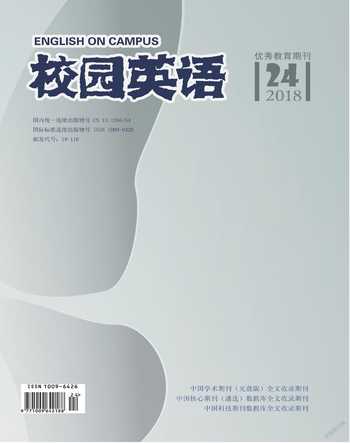A Study On Intersubjectivity in Subtitle Translation
【Abstract】With the turning of western philosophy from subjectivity to intersubjectivity, the discussion of intersubjectivity has aroused the attention in the field of translation. Based on Desperate Housewives, the writer intends to explore inter-relationships among main subjects. By applying intersubjectivity to the translation of subtitles, this paper summarizes practical translation suggestions for subtitle translation in order to provide some references for later translation studies.
【Key words】Subtitle Translation; Intersubjectivity;Desperate Housewives
【作者简介】王婉茹(1993.3.17- ),女,汉族,现就读于西安外国语大学英文学院2016级翻译学专业,主要研究方向:翻译理论与实践。
I. Introduction
With the growing international communication, more and more films and television works have been introduced into different countries. In this way translation has become an essential tool to know each others culture. This thesis chooses Desperate Housewives, a popular American TV series, as the case to study subtitle translation. It attempts to know how intersubjectivity is applied in the case study from the perspective of intersubjectivity in order to prove each subject is equal in translation.
II. Intersubjectivity
Intersubjectivity is the internal relations between subjects in the process of communication. In philosophy, intersubjectivity signifies the correlation or relevance between human beings as subjects in object activities. According to intersubjectivity, the subjects in translation are in the equal position, and the intersubjectivity is the co-existence of various subjects, which focuses on the mutual acknowledgement, acceptance and communication between them.
III. Manifestation of Intersubjectivity in Desperate Housewives
1.Manifestation of Intersubjectivity Between the Translator and the Screenwriter
In the process of translating foreign subtitles, the translator is in the position of communicator. So translators need to understand the original writers intention of writing.
Example:
Bree: Do you really think that I am enjoying airing my dirty laundry in pubic? This whole situation is mortifying.
Bree:你還真以为我喜欢把家丑外扬?这事真的是让我后悔莫及。
In this example, only some translators with English learning background could grasp the meaning of dirty laundry. Most of them may feel strange about the conventional expression. It means something shameful which is not supposed to be known to the public.
To summarize, in order to cater to Chinese readers reading habits such as stressing the completion of meaning, the clear and logical structure and the concluding statement the translators did the rearrangements above in his Chinese version.
2.Manifestation of Intersubjectivity Between the Translator and the Target Audiences
In the process of translating film and TV drama subtitles, the translator needs to regard himself as the target language audiences server, only when the audience is considered as one of the main subjects of the film and TV play, can the English film and television drama produce the greatest market effect in China.
Example:
Carloss mom: Does it only come in white? I am just saying, she is not fooling anybody.
Carloss mom:只有白色的嗎?我只想说,底子烂,怎么包装都不够美。
Gaby is selecting a wedding dressing for her wedding ceremony with her husband Carlos and mother-in-law. While Gabys mother-in-law thinks Gaby a material girl, so she makes a bad impression on her daughter-in-law Gaby. Thus in order to avoid the confusion and ambiguity, the translator applied this way of translation in order that the audience have a much clearer understanding with the relationship among the actors.
IV. Conclusion
The thesis attempts to show that intersubjectivity favors translation as an interactive communication among all the subjects involved in the translating process and all the subjects are equal. The study of intersubjectivity presents a new point of view for us, but the translation of subtitle is discussed in a general sense. It is not intended to represent a complete body of research, so there is still a long way to go.
References:
[1]Gentzler,Edwin.Contemporary Translation Theories[M].Shanghai Foreign Language Education Press.2004.

